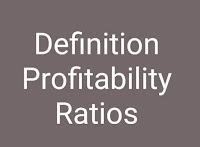Definition Profitability Ratios
 |
| Definition Profitability Ratios |
Profitability ratio is a ratio to assess a company's ability to seek profits. This ratio also provides a measure of the effectiveness of a company's management. This is indicated by the profit generated from sales and investment income. The point is the use of this ratio shows the efficiency of the company.
The use of profitability ratios can be done by using comparisons between various components in the financial reports, especially the balance sheet and income statement. Measurements can be made for several periods of operation. The goal is to see the company's development within a certain timeframe, whether decreasing or increasing, as well as looking for the cause of the change.
The results of these measurements can be used as a management performance evaluation tool so far, whether they have worked effectively or not. If they reach the specified target, they are said to have succeeded in reaching the target for a period or several periods. However, on the contrary if it fails or fails to achieve the set targets, this will be a lesson for management for the future period. This failure must be investigated where lies the error and weaknesses so that the incident is not repeated.
Then failure or success can be used as a reference for future profit planning, as well as the possibility to replace new management, especially after old management fails. Therefore, profitability ratios are often referred to as a measure of management performance.
0 Response to "Definition Profitability Ratios"
Post a Comment